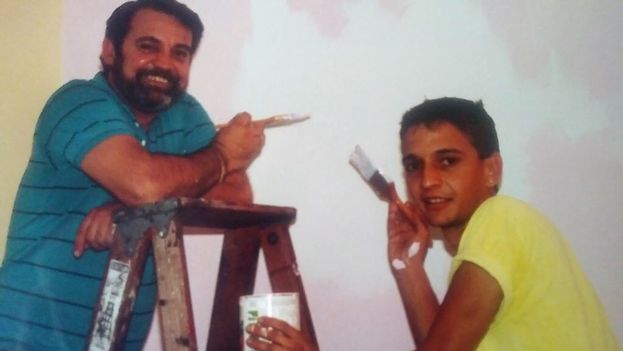
![]() 14ymedio, Mario Penton, Miami, 22 September 2017 — Carlos Iván González arrived in Florida in 1980, during the Mariel Boatlift exodus, barely 14 years old. Now, at age 50 and after establishing a family in the United States, deportation is hanging over his head. In 2012, he was sentenced by a state judge to five years in prison for growing and selling marijuana, trafficking in cannabis and possession of narcotic drug, and as soon as he got out he was confined to a detention center in Wakulla, where he has already spent more than 200 days waiting for Cuban authorities to approve his return to the island.
14ymedio, Mario Penton, Miami, 22 September 2017 — Carlos Iván González arrived in Florida in 1980, during the Mariel Boatlift exodus, barely 14 years old. Now, at age 50 and after establishing a family in the United States, deportation is hanging over his head. In 2012, he was sentenced by a state judge to five years in prison for growing and selling marijuana, trafficking in cannabis and possession of narcotic drug, and as soon as he got out he was confined to a detention center in Wakulla, where he has already spent more than 200 days waiting for Cuban authorities to approve his return to the island.
González’s laziness toward obtaining US citizenship has led to his dangerous situation. The commission of the crime led to the loss of his ‘Green Card’ (permanent residence permit) and his family fears that he will join the list of 2,746 Marielitos that the Cuban government agreed to receive in 1984 as a result of an agreement between Fidel Castro and Ronald Reagan.
During that exodus, more than 125,000 people escaped from the island on a maritime bridge authorized by Fidel Castro; among these were some criminals to whom the United States refused to grant asylum. With the pact between the presidents, the members of a list drawn up by the US must return to Cuba, but the returns have come slowly, in groups of between 90 and 100 each year, according to journalist Alfonso Chardy.
As a result, some of the deportables have disappeared, died or their health prevents them from traveling. Aside from those Marielitos agreed to 33 years ago, Havana refused to receive its citizens residing in the US with a deportation order until the signing of an agreement with the Obama administration in January of last year. At that time it was agreed to fill that quota with criminals with deportation orders who entered during the Mariel Boatlift, people like Carlos Ivan Gonzalez.
“Alone, without family, without friends or money. This is how my son would have to return if Emigration sends him to Cuba,” says Sarah Gonzalez. Carlos Ivan’s mother, 71, resides in Cape Coral (South Florida) and now laments her son having been too lazy to get naturalized.
Gonzalez held a hunger strike last week in Wakulla, along with ten other Cubans in the same situation, but they had to abandon it because they were ill without achieving their goal of being released, according to his mother.
“I know that my son is not innocent, but he has already paid society for his crime with five years in jail. Now they are now talking about eliminating the US embassy in Havana. The politicians continue with their conflict, while my son wastes his life in a cell,” she complains.
Sarah Gonzalez argues that a detention center official told her that Cuba had rejected the repatriation proposal from the US authorities but her son may have been included in the quota of “substitute” Marielitos.
“There is something going on with those who came through Mariel, and Washington is pressuring Cuba to accept them, even after Cuba has refused,” adds Sarah Gonzalez.
Meanwhile, Carlos Iván, a mechanic by profession, father of a firefighter and grandfather of a girl he has not yet met, is constantly guarded by the Immigration and Customs Enforcement (ICE).
An ICE official told 14ymedio that the average time of a person in custody with a deportation order is between 30 and 35 days. However, when there is serious evidence that the subject can be deported, that period can be extended.
Usually, in the cases of Cubans in this situation, an alternative to detention is sought, since the island’s government decision whether to receive the immigrant can take years.
Among the solutions ICE provides to maintain control over the individual are electronic monitoring and supervision orders, which allow the person to lead a normal life provided that they meet from time to time in agency’s offices and give an account of their situation.
“When lawyers appeal the judge’s decision or request extensions of certain legal proceedings, when this happens and the judge does not allow bail, the subject must remain in custody, which lengthens the process,” the official adds.
Gonzalez’s family says he does not have enough money to bring the case to court, and the official lawyers do not deal with immigration issues. However, there are various institutions such as the Catholic Church and human rights groups that offer free or low-cost services to immigrants.
“We are a couple of elderly diabetics and over 70. We have to send money to him to communicate with us and to eat better, because prisons are bad everywhere,” adds Gonzalez’s mother.
The family has tried to get help through Senator Marco Rubio’s office and the governor of Florida, but claims to have gotten “nothing.”
“When I called the media they hang up on me because they say it has to be interesting. Does it have to be interesting for a man to die on a hunger strike or to deprive him of his freedom to be on the news?” she asks indignantly.
